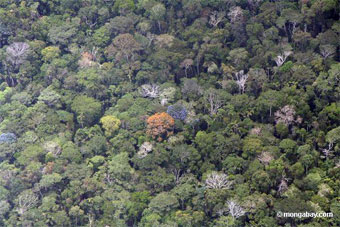Last month Brazil proposed the establishment of a fund to compensate developing countries that reduce deforestation, a move that follows a similar initiative by a coalition of developing countries led by Papua New Guinea and Costa Rica. The scheme could help cut greenhouse gas emissions that result from forest clearing and conversion. Deforestation currently is responsible for 20-25 percent of such heat-trapping emissions.
According to an update from the International Tropical Timber Organization (ITTO), the plan “calls for creating a fund for countries that had brought deforestation below 1990s rates” — a somewhat questionable target since Brazil’s deforestation rates before 1990 well exceeded its current rate of forest loss, which last month was estimated at 16,700 square kilometers for the 2005-2006 year. Nevertheless the proposal would address shortcomings in the current Clean Development Mechanism, an arrangement under the Kyoto Protocol that allows industrialized countries to meet their emissions commitment by investing in emission reducing projects in developing countries. Currently, notes the ITTO, the “Clean Development Mechanism allows carbon credit for planting trees where forests have already been cleared but offer no incentives for preventing cutting in areas like the Amazon.”
During the 1980s, Brazil’s deforestation rate in the Amazon averaged around 21,000 square kilometers per year. Forest loss peaked in 1995 at 29,059 square kilometers but figures for the past two years have been substantially lower at 18,900 square kilometers for 2004-2005 and 16,700 for 2005-2006.
Related articles
 Amazon rainforest |
Avoided deforestation could help fight third world poverty under global warming pact — 10/31/2006
Avoided deforestation will be a hot point of discussion at next week’s climate meeting in Nairobi, Kenya. Already a coalition of 15 rainforest nations have proposed a plan whereby industrialized nations would pay them to protect their forests to offset greenhouse gas emissionsm. Meanwhile, last month Brazil — which has the world’s largest extent of tropical rainforests and the world’s highest rate of forest loss — said it promote a similar initiative at the talks. At stake: potentially billions of dollars for developing countries. When trees are cut greenhouse gases are released into the atmosphere — roughly 20 percent of annual emissions of such heat-trapping gases result from deforestation and forest degradation. Avoided deforestation is the concept where countries are paid to prevent deforestation that would otherwise occur. Policymakers and environmentalists alike find the idea attractive because it could help fight climate change at a low cost while improving living standards for some of the world’s poorest people and preserving biodiversity and other ecosystem services. A number of prominent conservation biologists and development agencies including the World Bank and the U.N. have already endorsed the idea.
Carbon trading could save rainforests. A new rainforest conservation initiative by developing nations offers great promise to help slow tropical deforestation rates says William Laurance, a leading rainforest biologist from the Smithsonian Tropical Research Institute in Panama, in an article appearing Friday in New Scientist.
Rainforests worth $1.1 trillion for carbon alone in “Coalition” nations. If a coalition of developing countries has its way, there could soon be new forests sprouting up in tropical regions. The group of ten countries, led by Papua New Guinea, has proposed that wealthy countries pay them to preserve their rainforests. The Coalition for Rainforest Nations argues that all countries should pay for the benefits — from carbon sequestration to watershed protection — that tropical rainforests provide.
Developing countries: pay us to save rainforests. At this week’s United Nations summit on climate change in Montreal a coalition of tropical developing countries plans to propose that wealthy countries pay them to preserve their rainforests. The group of 10 countries, led by Papua New Guinea and Costa Rica, will argue that they should be compensated for the services rainforests provide the rest of the world.
This article used quotes from the September 15-30 ITTO Tropical Timber Market (TTM) Report.